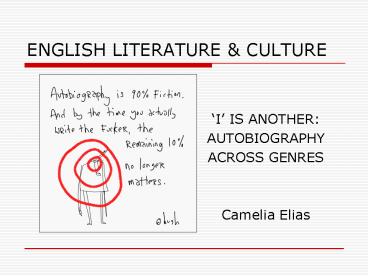ENGLISH LITERATURE
1 / 10
Title:
ENGLISH LITERATURE
Description:
... (Reading Autobiography, Smith and Watson) subjects the reader (interpellation, Althusser) ... a universal or objective point of view implies a particular ... – PowerPoint PPT presentation
Number of Views:44
Avg rating:3.0/5.0
Title: ENGLISH LITERATURE
1
ENGLISH LITERATURE CULTURE
- I IS ANOTHER
- AUTOBIOGRAPHY
- ACROSS GENRES
- Camelia Elias
2
the digital self ? agency (Reading Autobiography,
Smith and Watson)
- subjects the reader (interpellation, Althusser)
- a universal or objective point of view implies a
particular ideology of the subject - agents change and change their world by virtue
of the systemic operations of multiple
ideologies. - multiple ideologies expose both the subject and
the system to perpetual reconfiguration.
(Elizabeth Wingrove, Interpellating Sex, Signs
24, no. 4)
3
plays with transverse tactics (de Certeau)
- individuals and groups deploy tactics to
manipulate the spaces in which they are
constrained (ex. work place) - a factory worker may superimpose another system
(of language or culture onto the system imposed
on him in the factory
4
plays with imagination
- imagination negotiates between sites of agency
(Arjun Appadurai, Disjuncture and Difference in
the Global Cultural Economy) - imagination negotiates between imagined
communities - imagination negotiates between globally defined
fields of possibility - individuals as sites of agency deploy their
imaginations as a social fact and a kind of work
to navigate the disjunctures of global flows
that create radically different
self-understandings
5
agency as the possibility of variation
- performing an (avatar) self (Judith Butler)
- games of culture
- the unconscious is a potential site of agency
(Teresa de Laurentis, Eccentric Subjects) - excess is a source of resistance to socially
enforced calls to fixed identities
6
Federman
- autobiography within criticism
- the personal as paratext (footnotes, dedications,
acknowledgements) - have some fun! nobody is perfect
- instruct! acknowledge the limit of your knowledge
- subvert politics! mess up the authorial voice
who speaks what to whom, on what and whose
authority - the personal is both a risk and an opportunity
7
autobiography as a testimony for culture
- stage
- spectacle
- performance (no authenticity)
- active agency/engaging
8
juxtapositions
- Miloi
- diary as a self-portrait
- Je est un autre
- biographic ego vs the profound ego
- 1st perosn narrative
- time
- Federman
- I dont keep a diary
- I dont need one
- writing about oneself is in fact writing about
the other selves that exist in all of us - 3rd person self- narrative
- diarists invent things
- many writers like to write self-portrait of
themselves MY BODY IN NINE PARTS
9
- Miloi
- why arent people (readers and writers as well)
interested as they were in prose or poetry and
they now prefer the small, insignificant history
of a certain individual. - Who is talking in the diary, who is being silent
and why?
- Federman
- So the question should be why the fuck do you
continue to write novels Federman?Why dont you
write a diary? Or why dont you give up writing?
10
- Christine
- that there isnt just one voice speaking in a
diary because it is written from different point
of views - conscious process of writing about oneself
- I am created through my thoughts and while
constructing myself I consider the situation
what is it good for me to tell the person across
the table, what do I tell my boss and what is
kept in silence. - self-portrait
- belief
- Camelia
- decapitated ontology
- the diarist losing his head
- marginalia
- Federman ? time in fiction deliberately fucks up
time or what the great Beckett once called that
great fornicator -- that double-headed monster.































